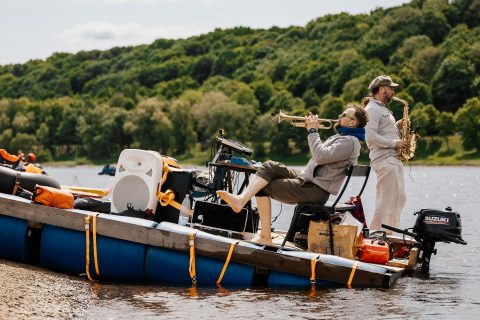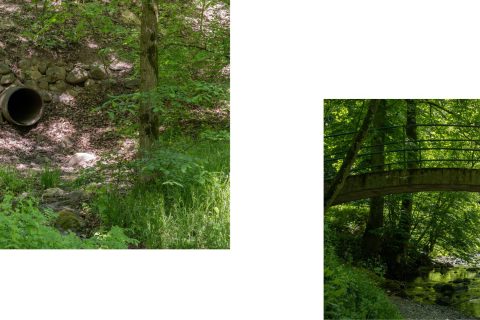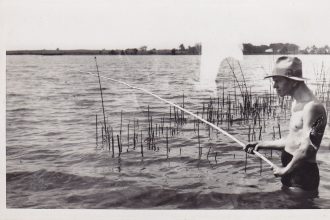“We are walking around the Baltic Sea because we want to increase public awareness, draw attention to its pollution, and reach as many people as possible,” this is how Stefano Accossato, one of the participants in the Save the Baltic Sea expedition briefly presents it. An Italian-born Kaunas local with his wife Vitalija Lyska-Accossato and a dozen other environmental activists started the trip in Smiltynė on March 11. The goal is 6000 kilometers, 8 countries. 9 months of walking, meetings, lectures, seminars, and research.
[Updated 28 June, – representatives of the project announced that the particicipants are on their way home and the initiator Giedrius Bučas is continuing the trip alone]
The initiator and leader of the hike is Giedrius Bučas from Kaunas, a public figure already familiar to the readers of our magazine, who has recently been paying full attention to environmentally friendly activities. In 2020 he covered 1400 kilometers around Lithuania with the team; they were collecting garbage on their way. Back then and during the Save the Baltic Sea expedition the most “popular” type of trash was cigarette butts. One pollutes a cubic meter of water – crazy, right?
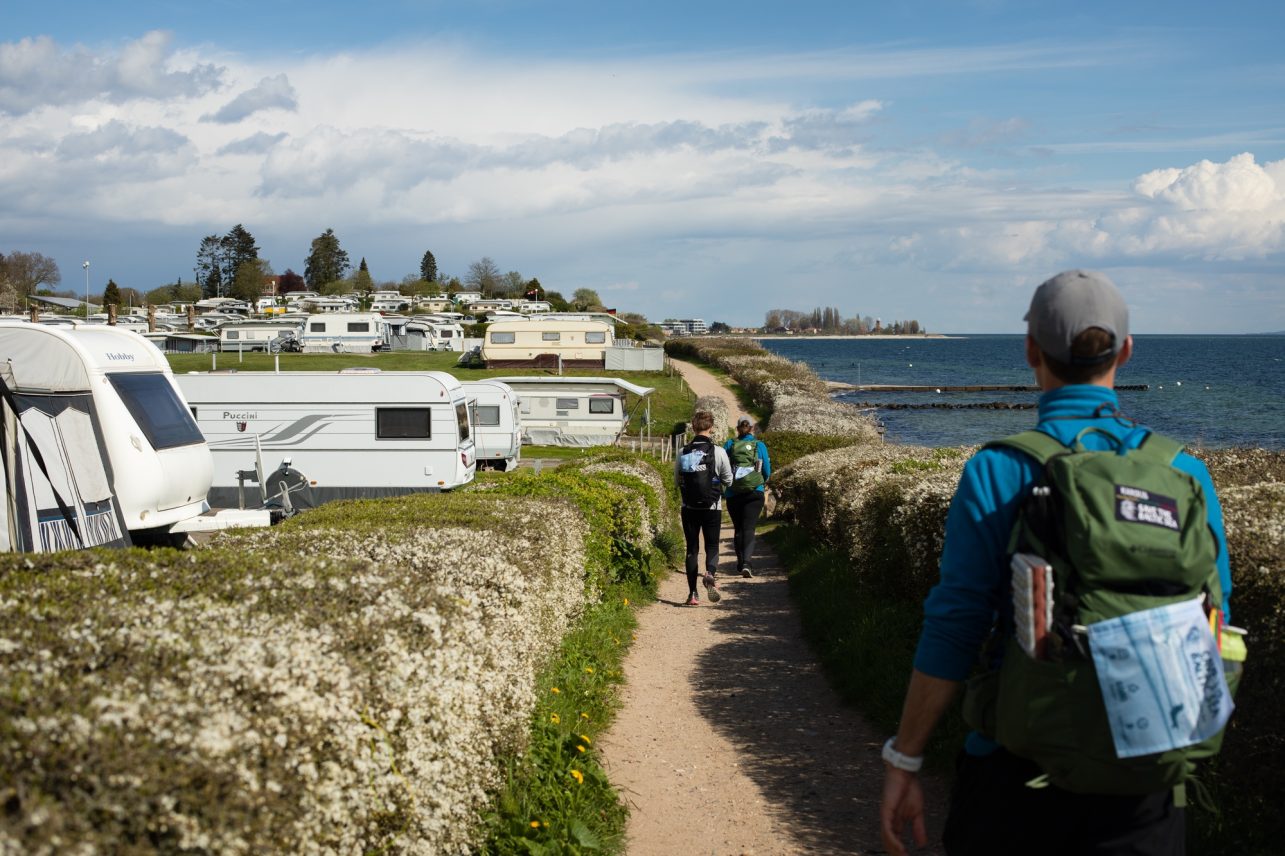
The facts are alarming: the Baltic Sea is among the five most polluted in the world. Of course, the participants of the historic expedition are not naive – the situation will not change in nine months. “We reach the concerned citizens easily, but it is more difficult with the indifferent ones. Therefore, it is important to document everything and turn it into a film or other product with lasting value in the future,” Stefano is convinced. I had a call with him and Vitalija, whom I remember from the Kaunas 2022 project (she worked as a volunteer program coordinator and was great at it!) at the beginning of May, when the expedition team was in Sweden.
How many kilometers did you cover today?
Stefano: Everything is a bit more complicated. I walked 18 kilometers today, but that’s not the whole distance for today, a total of 34 kilometers was planned. Not all of us walk every day. We have a minibus that holds part of the team and all our stuff. We are constantly changing.
What motivated you to embark on this expedition? I know you like to travel; you were in India for a long time before moving to Kaunas. But it is not an easy journey. What did you have to sacrifice for it?
Vitalija: I had heard that Giedrius Bučas has had such an idea for some time before the invitation to join was announced. At first, it sounded like another utopia coming from a man with many strange ideas. But when I saw the ad that clearly stated who should do what and how they would be remunerated, I knew it was my dream job. You walk, travel, visit different countries, perform a function, and even receive some money. Of course, those nine months sounded a bit terrifying. But apparently, the time was right for it. After Kaunas 2022, I got involved in all kinds of temporary projects, but nothing serious. Stefano offered to live in Italy, and I thought we had nothing to lose. We moved from a rented apartment in Žaliakalnis to an Italian village. After three months, we returned to Lithuania to start the expedition.
I attend therapy every week – I think it helps keep me sane. The therapist has asked me why I need it and continues to. I still don’t have a solid answer. Maybe it’s a professional crisis that’s been going on for a few years and I need a challenge to get out of it. If Stefano hadn’t agreed, I certainly wouldn’t have participated alone.
Stefano: I didn’t want to live in my home country for a long time, but that desire returned – or rather, the negative feelings passed. I realized that I miss Italy, my family, and the mountains, and I must go back to reacquaint myself with my country. It’s nice that we managed to stay there for a few months, but then this project started [laughs]. It was difficult at first, yes, because before I had an idea of how I would live at least a few months ahead. Of course, I’m always in favor of traveling, especially on foot. I really like hiking. I thought, like everyone else, about the Camino de Santiago, but this option turned out to be more interesting, although more difficult. Is it really possible? Can I trust Giedrius? Will there be enough money?
I was considering leaving my job at TutoTOONS, a game development company where I spent five years. To be frank, like Vitalija, I was overcome by a professional crisis. I realized that I could do what I do for a long time – leading a team in digital marketing – but do I really want to? I had no alternatives, so this expedition turned out to be a way to change something. Finally, I reached an agreement with my workplace that I would not leave, and now I work several hours a week, advising my colleagues. It takes time and energy, but financial security is important. And I haven’t decided yet if I want to return to the same life in Lithuania or live in Italy for a bit.
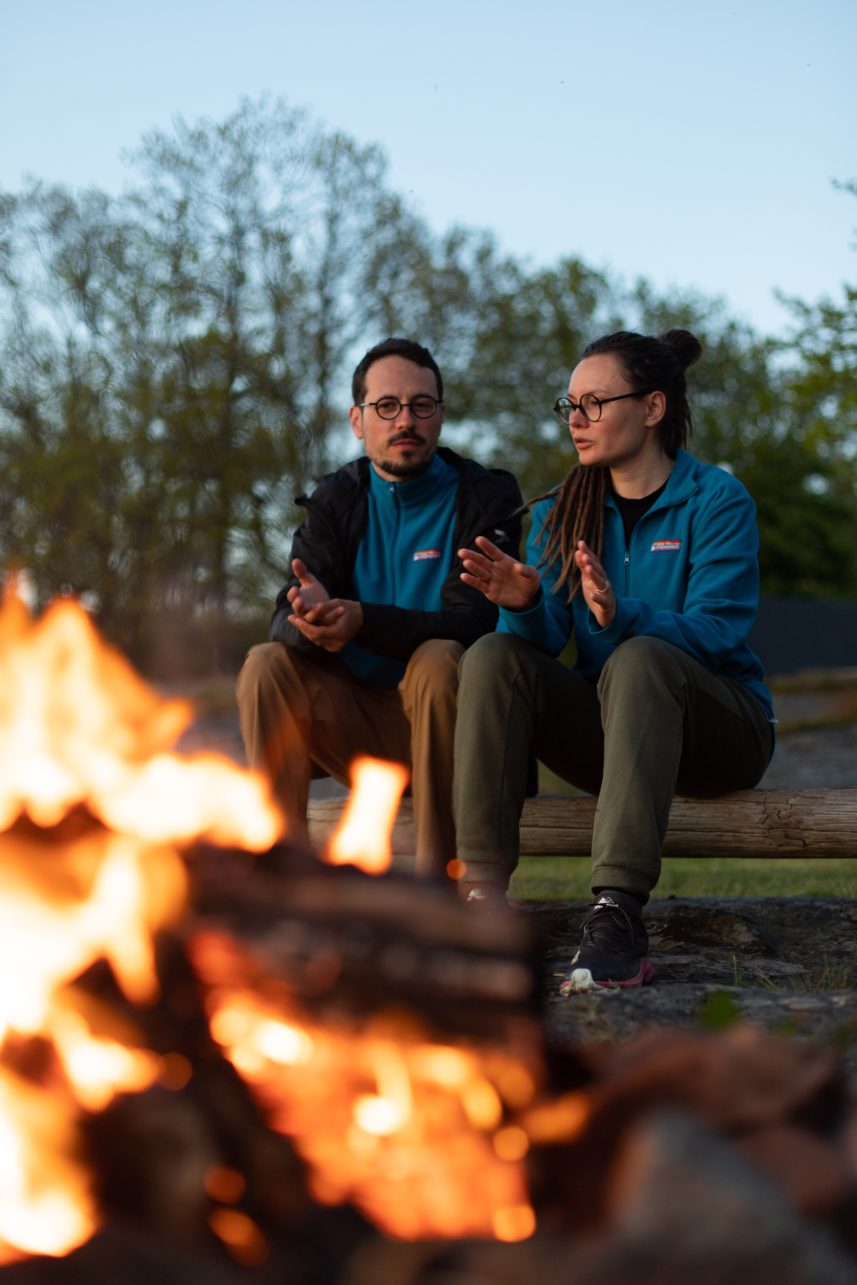
Maybe the expedition doesn’t have to be the place for answers. It sounds like a great opportunity to be in the here and now, although fast internet obviously makes it difficult. Are you able to disconnect completely?
Vitalija: Well, not completely because our jobs require a connection. But this shows the complexity of the expedition – it is both a hike and an education. For example, I lead reflections and team-building sessions. They need time and… internet. We participate in events that also require preparation. Perhaps if one of the challenges was abandoned, the project would be more stable, but its meaning would be completely different.
The team is made up of very different and ambitious people. It took more than one meeting for everyone to figure out that personal challenges are not the most important thing here. No, the goal of this expedition is not for everyone to go beyond their limits and walk 6 thousand kilometers in 9 months, although we communicate these numbers externally. The goal is to do it as a team. Route coordinators (by the way, I was interested in this position at first, but I don’t know enough about maps, the logistics looked interesting, but it turned out to be too much physical work) walk the most since they are experienced hikers. Women in charge of communication have to process the information for broadcasting, so they walk much less. I am learning to take care of myself and understand when I have to cut myself some slack and when I can do more. When I was applying for the expedition, I said that I really didn’t want to die for the Baltic Sea. Since we joined the team quite early, I contributed to making the expedition members more comfortable. For example, at the beginning of the expedition, when it was cold, we tried to sleep in beds, get a good rest. Now we choose tents more and more often. It’s a marathon. And I really don’t know how it will end.
Stefano mentioned longing for the mountains, Vitalija said she wouldn’t die for the Baltic Sea, but it was before they left. How about now? Did your perspectives change?
Stefano: Yes, now I have a clearer understanding of what poor sea condition means and how much our unconscious daily choices affect it. What we use, how much we use… It’s interesting that at first, we only had the perspective of Lithuania, but now, after crossing Poland, Germany, and Denmark, wider horizons have opened. We begin to realize what our common sea means to others. The problems and their solutions differ. n Denmark, for example, it is planned to build a new peninsula – to extend Copenhagen into the sea. It will affect us all.
Vitalija: Indeed, I didn’t know anything about the state of the Baltics. Compared to my colleagues, among whom is a marine biologist (she is not a member of the expedition but of the organizing team), I was not ready. Walking around the sea is a great way to educate yourself. After all, scientists have all the data, they have been observing the situation for many decades. Lithuania is a signatory to an agreement (in 2007, the Baltic Sea countries and the European Union, together forming the Baltic Sea Environmental Protection Commission, or HELCOM, adopted the Baltic Sea Action Plan – a strategic program of measures and actions for achieving the good environmental status of the sea by 2030. Over 50 percent of the agreed joint actions have not yet been implemented, ed.). But there is little talk about it in the public space. Only when I embarked on this journey did I learn how many types of seals live here: it turns out, as many as three. We don’t seem to value the sea as if it doesn’t deserve a better life. Our expedition introduced a communication campaign Will You Go to Nida if The Sea is No Longer There? That’s a great slogan. In fact, compared to others, the Baltic Sea is very young, enclosed, and shallow. You can jokingly call it a lake. The water in it changes only every 30 years!
It is interesting that the geopolitical situation also affects your route. You can’t really go through part of the Curonian Spit or St. Petersburg. So how can you agree on something if you can’t even go around the whole sea with one passport?
Vitalija: There are other sections where we will sail instead of going by land and wandering deeper into the mainland. If it weren’t for the war, the story would be different. I think, we would hike through Kaliningrad. The vision of this route is friendship but for now, as Stefano mentioned, it is quite forced – we only share the sea. Do we consciously realize that we are all connected in the world and that a wave on one end of the planet affects me on the other?
It sounds utopian, one hike will not solve the problem, but as Giedrius says, at least we will know that we tried. That’s why we discuss more than just the sea during our stops and presentations. For example, the problem of microplastics. If I stop washing fabric at high temperatures, especially synthetic ones, it will not only benefit the Baltic Sea but the rest of the planet. Or, for example, fast-degrading plastic, which sounds like a panacea but it’s not because it simply turns to microplastic faster, which we ingest later, and it is subsequently discovered in the placenta. I learned all this during the expedition.
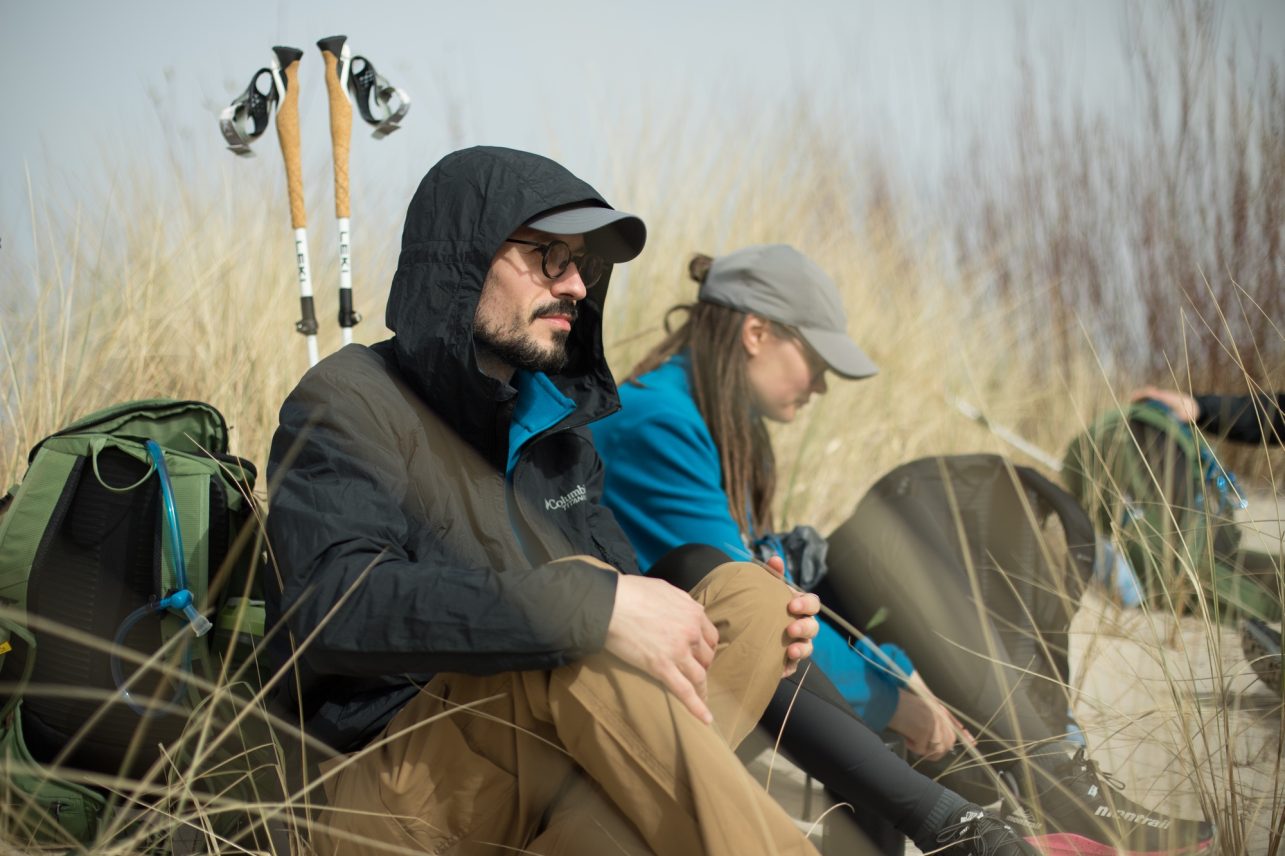
I can imagine that such an expedition might affect your relationship.
Vitalija: We had periods in life where we spent the whole day together. But here, we are colleagues. It is a new challenge that requires a lot of resources – to understand whether I am communicating with a partner, a colleague, or just a person. Which one is angry now? Are they angry with me or with a situation? Let’s add the fact that we hardly have time for just the two of us. Well, only in the tent when we spend the night in it. Whether all this is helping us grow as a couple, I cannot say yet. But there is an opportunity to remember that I know meditation, and various breathing techniques [laughs].
Stefano: Yes, the hardest part is seeing each other in a work context. We used to talk about work problems in the evenings and on weekends. In general, until the expedition, we could afford to simply not talk about some situations. We were more rested. Now Vitalija saw how angry and strict I can be, and I noticed how emotional her reactions to work challenges are. I’m trying to understand when I can be open and when I’d rather hold back and wait for a more appropriate moment that never comes because there’s no time. I’m always busy here. I’m responsible for the logistics, for making everything work, and if something breaks down, I have to fix it. I’m interested in this position, that’s what I wanted – to understand how such expeditions work, what is a good leader and how one should not behave. Maybe I’ll want to continue doing something like that, only in the mountains [laughs].
You won’t be back until December. What do you miss in Kaunas? (Vitalija and Stefano decided to leave the expedition when the magazine was already printed, – editor’s note)
Vitalija: We may take a short vacation and return to Kaunas earlier. I see pictures of friends lying on the grass, basking in the sun. I envy them! They are having fun, and in the evening, they will be able to go back to their actual homes. I really miss very simple things like good coffee. If you only knew what we drink here and at what price! And I miss the most delicious ice cream in the world, Angolo Italiano. Now that the second shop has opened in Laisvės Avenue, perhaps the queues have been reduced?
No…
All photos from the archives of Save the Baltic Sea

